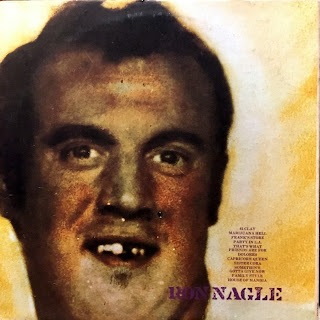Bad Rice
Ron Nagle
Warner Bros. WS 1902
1970
My obsession with the San Francisco Sound led me to Ron Nagle's mid-1960s group the Mystery Trend. For many years they were a mystery to me, a trippy name I encountered on old concert posters or histories of the San Francisco rock scene. Eventually I heard their excellent 1967 single "Johnny Was a Good Boy" which whetted my appetite to hear more. Finally I got the Big Beat CD compilation of their unreleased recordings and was enormously impressed. Their music was of astonishingly high quality and deserved an actual album back when they were still active. Unfortunately they were totally out of touch with the hippie zeitgeist of that era with their commitment to well-crafted songs and chamber pop along with their total disdain for the psychedelic scene. I figured I had satisfied my curiosity about the Mystery Trend but then several years ago I came across this album while flipping through a record bin. I had no idea what it was, I was just struck by how weird and ugly it was. As I examined it I remembered who Nagle was and eagerly bought it. It sounds nothing like the Mystery Trend but I was not disappointed I bought it. The album gets off to an exciting start with "61 Clay" which is a Chuck Berry style rocker that reminds me that Nagle was an rhythm and blues/rock and roll fanatic when he first got into music. There is a smoking guitar solo from Ry Cooder that kicks out the jams and puts the song over the top. The lyrics are pure teen rebellion with a little matricide thrown in. It is easily my favorite track on the album. The record's momentum continues with the rollicking boogie "Marijuana Hell" which Nagle co-wrote with John Blakeley. The song outlines the evils of marijuana with all the fervor of "Reefer Madness." I assume it is a joke although Nagle's drug of choice was alcohol and he never hid his contempt for hippie culture so who knows. The album abruptly shifts direction with the melancholy "Frank's Store" which is driven by Nagle on piano and a poignant string arrangement by the album's producer Jack Nitzsche. Nagle's vocal is full of emotion and puts across the sadness in the lyrics very effectively. The album returns to boogie with "Party in L.A." although this is not an ode to partying down with some Angelenos. The party of the title is the Communist Party (or some like-minded variant) and the song describes a child custody dispute between a leftist activist mom and a centrist father. Just your typical pop song. Side one concludes with "That's What Friends Are For" which returns to singer-songwriter melancholy. Nagle croons the lyrics about the nature of a relationship while accompanying himself on piano. Side two starts with "Dolores" which is lushly orchestrated by Nitzsche. It sounds like something by Nagle's idol Burt Bacharach until I listen to the lyrics which I interpret as an older woman teaching a boy the ways of love. "Capricorn Queen" is a raucous rocker about Nagle's addiction to alcohol. It features a frenetic rockabilly style vocal from Nagle and is another one of my favorite tracks. "Sister Cora" is a wonderful riff-driven banger about the title character's ability to cure folks' ills and solve their problems. The album settles down with "Somethin's Gotta Give Now" which has a country feel to it and displays some of the pop craftsmanship Nagle exhibited with the Mystery Trend. The country sound continues with the lumbering "Family Style" which features mildly vulgar and humorous lyrics about a disorderly family. The record concludes with "House of Mandia" which manages to combine the two musical directions on the album. The verses are powered by a heavy riff over which Nagle bellows about a working class man's misery while the choruses are silky smooth pop with Nagle crooning a description of a tropical paradise supported by Nitzsche's sugary string arrangement. Normally I would have a problem with such a schizophrenic record. The abrupt shifts between rock and singer/songwriter pop are definitely jarring to me, but the consistency of tone and overall intelligence of the record smooth it over somewhat. I definitely prefer the rock side though. Nagle's career was primarily teaching art and creating ceramic art with a lot more success than he had as a musician. However he was no dilettante, he had genuine chops and great integrity as a musical artist and certainly deserved a better fate. He is often compared to Randy Newman because they both value musical craftsmanship and display a dark sense of humor. Nagle is far less cynical than Newman though and he likes rock a lot more than him as well. He is also a better singer. This album is well worth seeking out. You rarely find such a stimulating combination of intelligence and sincere love of rock and roll. Recommended to people who think it would be cool if Randy Newman jammed with Creedence Clearwater Revival.




No comments:
Post a Comment